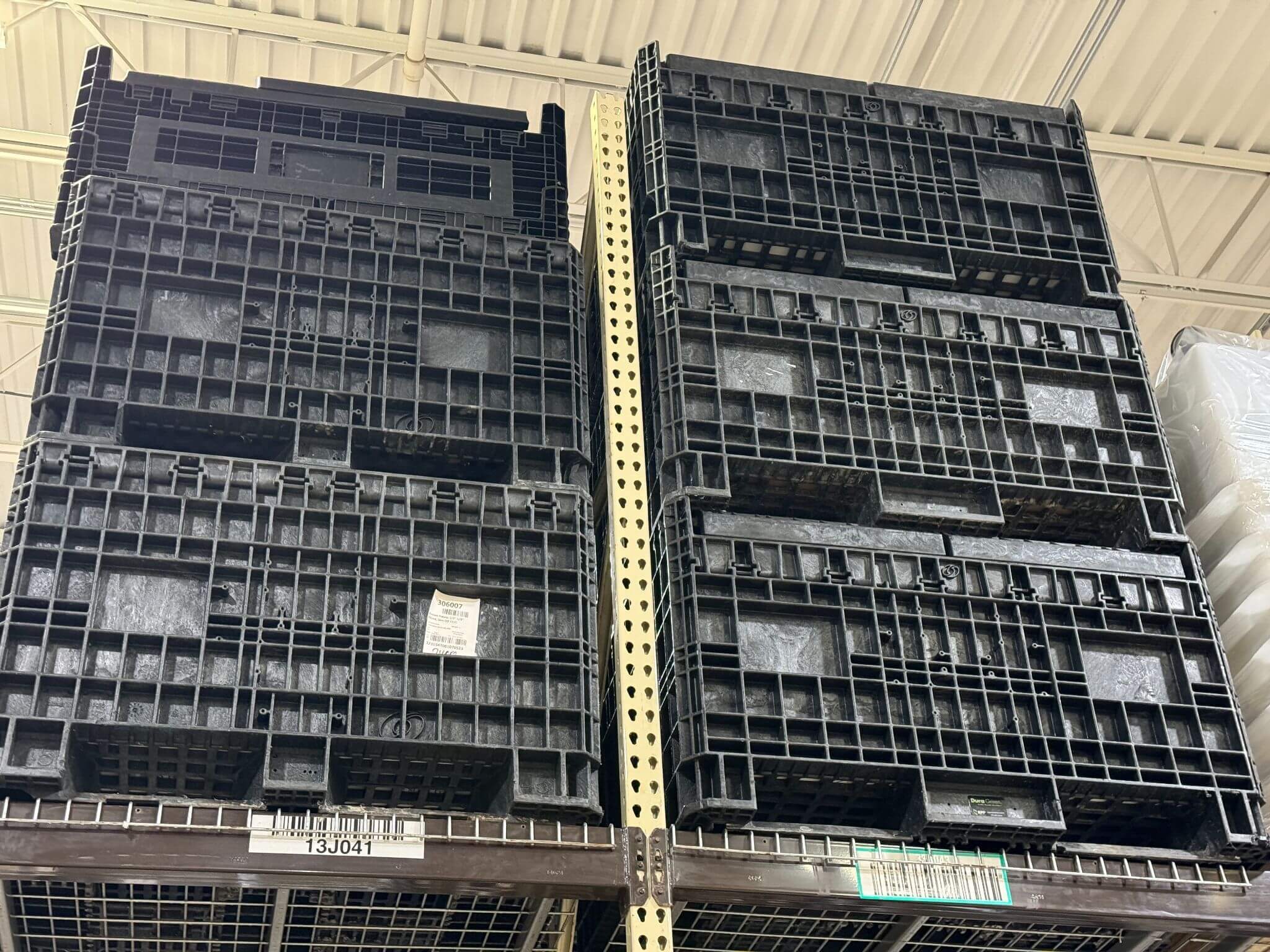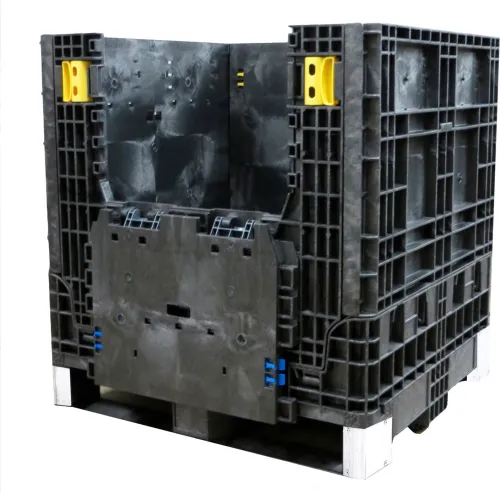Why Bulk Containers Are Essential for Lasting and Economical Transport
Mass containers play an essential function in contemporary logistics. They promote the effective movement of large amounts of items, therefore maximizing transport procedures. This approach not just minimizes expenses however also decreases ecological impact through reduced discharges and waste generation. As industries look for even more lasting techniques, the fostering of bulk containers is coming to be increasingly significant. What implications does this shift hold for future logistics and supply chain administration?

The Advantages of Making Use Of Mass Containers in Logistics
Bulk containers transform logistics by improving performance and sustainability. These containers permit for the transport of large quantities of items in a solitary journey, considerably lowering the number of trips required. This not just streamlines operations but also decreases labor prices connected with handling, filling, and discharging. Furthermore, bulk containers are made to maximize area use within transport automobiles, making certain that more items can be shipped concurrently.
The standardization of mass containers additionally simplifies the logistics procedure. With consistent measurements, they can be easily stacked and kept, bring about improved warehouse monitoring. Mass containers often include durable products that safeguard contents from damage throughout transportation, therefore lowering item loss and raising total reliability. Because of this, organizations can experience enhanced supply chain performance, inevitably causing raised success and consumer complete satisfaction. This combination of elements makes bulk containers a critical property in modern-day logistics.
Environmental Influence: Minimizing Waste and Carbon Impact
As sectors progressively prioritize sustainability, the fostering of mass containers has arised as a vital approach for lowering waste and reducing carbon footprints. These containers lessen making use of product packaging materials, such as boxes and plastic, thus significantly reducing general waste generation. By consolidating deliveries, bulk containers boost transport performance, allowing for even more items to be delivered per trip. This decrease in trips straight correlates with reduced greenhouse gas exhausts, adding to a smaller carbon impact.
Bulk containers can often be reused or reused, better alleviating environmental impact. The resilience of these containers assurances they can withstand multiple transport cycles, reducing the requirement for single-use choices. refurbished bulk containers. By streamlining logistics and promoting efficient source usage, bulk containers not only sustain lasting techniques yet also motivate sectors to align with global ecological goals. Ultimately, their implementation shows a dedication to eco-friendly stewardship and accountable resource monitoring
Cost Savings: Exactly How Mass Containers Lower Transport Costs
While lots of companies look for means to improve their lower line, the usage of bulk containers offers a considerable possibility for lowering transportation expenses. Bulk containers make best use of the quantity of goods moved, permitting services to deliver larger amounts at the same time. This efficiency minimizes the variety of journeys needed, directly decreasing fuel expenses and reducing labor expenditures connected with loading and unloading.
In addition, bulk containers frequently include structured designs that optimize space application within transportation vehicles. This suggests less vacant areas, bring about a lot more efficient use available capacity. The durability of bulk containers can lower the risk of item damage during transportation, lowering losses and making certain that even more items show up intact.
Enhancing Supply Chain Efficiency With Mass Storage Solutions
Mass storage remedies play a necessary function in improving supply chain performance by enhancing inventory monitoring. By combining goods right into fewer, bigger containers, organizations can greatly decrease taking care of prices connected with constant transfers and processing. This streamlined strategy permits much better monitoring and management of supply, inevitably resulting in enhanced functional efficiency.
Structured Inventory Monitoring
Efficient inventory monitoring is necessary for optimizing supply chain procedures, specifically when companies embrace bulk storage space services. These services make it possible for businesses to maintain greater stock levels while reducing the regularity of replenishment. By settling materials right into bulk containers, firms can streamline their stock processes, lowering the intricacy related to tracking numerous smaller bundles. This method facilitates precise stock counts and improves forecasting accuracy, permitting even more informed decision-making. Furthermore, bulk storage options streamline storage facility organization, making it much easier to find and gain access to products when required. Consequently, organizations can achieve a much more reliable stock turnover price, ultimately enhancing total supply chain efficiency and decreasing the chance of stockouts or overstock circumstances.

Reduced Handling Expenses
The implementation of mass storage space options not just simplifies inventory management however likewise considerably reduces managing expenses throughout the supply chain. By combining materials into bulk containers, companies lessen the requirement for constant handling and transfer between different storage space and transportation units. This technique reduces labor costs related to loading, discharging, and moving smaller sized bundles. Additionally, mass storage lowers the regularity of deliveries, resulting in lower transport costs and reduced gas usage. Consequently, services can maximize their logistics procedures, allowing for a much more reliable allotment of sources. Ultimately, lowered managing prices contribute to enhanced total supply chain effectiveness, promoting an environment that supports both sustainability and economic stability.

Versatility of Mass Containers Across Different Industries
Several sectors have distinctive demands for transportation and storage, bulk containers have arised as a functional remedy that meets a vast variety of demands. These containers, ranging from large containers to specialized containers, can accommodate diverse products, including liquids, granules, and powders. In the farming field, bulk containers facilitate the transportation of plant foods and grains, while the food and beverage industry uses them for active ingredients and completed items. The chemical market counts on bulk containers for securely transferring hazardous products, making sure compliance with safety guidelines. In addition, building firms profit from bulk containers for delivering aggregates and other materials. Their flexibility reaches different modes of transport, consisting of ships, trucks, and trains, boosting logistical performance. This flexibility not just improves operations throughout various markets yet additionally advertises sustainability by lowering packaging waste and optimizing space in transit. Mass containers play a vital role in modern supply chain monitoring.
Future Patterns wholesale Container Usage and Sustainability
The future of mass container usage is progressively formed by innovative products growth that enhances sustainability. Additionally, automation in logistics guarantees to streamline operations, reducing waste and improving performance. Accepting round economic climate methods will additionally revolutionize just how bulk containers are created, used, and recycled, promoting an extra sustainable transportation landscape.
Ingenious Materials Growth
As markets significantly focus on sustainability, innovative materials growth wholesale containers becomes a significant variable in improving green transport solutions. Researchers and producers are checking out biodegradable plastics, recycled compounds, and lightweight metals to decrease ecological influence. These materials not just minimize waste but likewise boost fuel efficiency by lowering the overall weight of containers. Furthermore, innovations in smart materials, which can adapt to varying problems, improve the toughness and performance of bulk containers. The combination of these innovative products aligns with circular economic situation principles, advertising reuse and recycling. As the need for lasting techniques expands, the growth of such products will certainly play a vital role fit the future of try here mass container use in logistics and transport.
Automation in Logistics
Significant browse around this site improvements in automation are positioned to transform logistics and the usage of mass containers, improving sustainability in transportation. Automated systems, including drones and autonomous automobiles, are enhancing the motion of mass containers, lowering the dependence on typical fuel-powered transportation. These modern technologies maximize directing and packing processes, enhancing and decreasing empty miles gas effectiveness. Additionally, automated inventory monitoring systems enhance tracking and tracking of bulk containers, making sure better resource allotment and decreased waste. The integration of the Net of Points (IoT) permits real-time data analysis, allowing proactive decision-making that lines up with sustainability goals. As automation continues to progress, it is anticipated to drive additionally developments in mass container usage, eventually supporting even more sustainable logistics methods and reducing the ecological influence of transportation.
Round Economic Climate Practices
Advancements in automation are establishing the phase for an extra incorporated approach to round economy methods in the domain of bulk container usage. As sectors significantly welcome sustainability, bulk containers are being Learn More Here developed for longevity and reusability. This shift not only reduces waste yet likewise improves source efficiency. Business are adopting strategies such as closed-loop systems, where used containers are gathered, reconditioned, and reestablished into the supply chain. Additionally, clever innovations track container life cycles, promoting much better monitoring and minimizing environmental impact. The collaboration between producers, logistics companies, and end-users is vital in developing standards for lasting container usage. refurbished bulk containers. Future fads show a growing focus on materials that are recyclable and biodegradable, additional enhancing the circular economic situation's concepts in mass transportation

Frequently Asked Questions
What Products Are Mass Containers Usually Made From?
Bulk containers are commonly constructed from durable products such as high-density polyethylene, steel, cardboard, and light weight aluminum. These products offer protection, strength, and flexibility, making them ideal for transferring different goods in different industries effectively.
Exactly how Do I Select the Right Dimension Bulk Container?
Choosing the best dimension bulk container includes evaluating the volume of products to be transferred, considering managing equipment compatibility, and evaluating storage area demands. Proper dimension assurances effectiveness in transportation and reduces waste throughout shipment.
Are Bulk Containers Reusable or Recyclable?
Mass containers are often recyclable, created for several trips, enhancing sustainability. Numerous can likewise be recycled, relying on the materials used. Selecting recyclable options additionally reduces and sustains environmental goals waste in transportation practices.
What Safety And Security Regulations Relate To Bulk Container Transport?
Safety guidelines for bulk container transport consist of compliance with the Department of Transport guidelines, proper labeling of unsafe products, architectural stability assessments, and adherence to weight limits to ensure safe handling and protect against crashes throughout transit.
Exactly How Can Businesses Shift to Utilizing Mass Containers Effectively?
Businesses can transform to bulk containers by reviewing current logistics, educating staff on handling, purchasing suitable devices, maximizing stock management, and working together with distributors to assure compatibility and performance throughout the supply chain.
As sectors increasingly prioritize sustainability, the fostering of bulk containers has arised as an essential strategy for decreasing waste and lowering carbon footprints. By settling products right into mass containers, business can improve their stock procedures, lowering the intricacy associated with tracking multiple smaller sized packages. As industries progressively prioritize sustainability, cutting-edge materials development in bulk containers arises as a significant factor in improving eco-friendly transportation solutions. Automated systems, consisting of drones and independent cars, are enhancing the movement of mass containers, minimizing the dependence on traditional fuel-powered transportation. Furthermore, automated supply management systems boost monitoring and tracking of mass containers, making certain far better resource allotment and decreased waste.